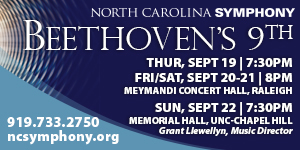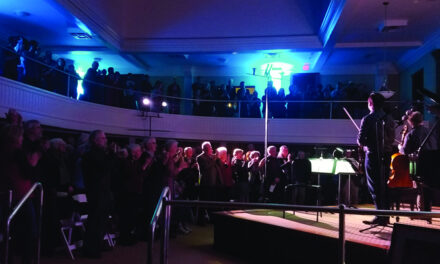The Ciompi Quartet’s second concert of three for Duke’s Summer Music Festival focused on impressionistic pieces from this century and the last. The quartet performed a thoughtfully coordinated program in the timbered ambiance of Kirby Horton Hall in the Doris Duke Center at Duke Gardens. The music seemed to reflect both the colorful vibrancy and the mellow serenity of the gardens visible from the hall’s windows.
The evening turned into something of a showcase for area harpist, Emily Laurance. Her participation added a layer of unity to three works with interconnecting themes.
André Caplet, an assistant to Debussy (he orchestrated and conducted the premiere of “Le martyre de Saint Sébastien” among other duties) was a composer in his own right, although certainly influenced by Debussy. Caplet’s “Conte fantastique” for harp and strings, published in 1924, is a twenty-minute evocation of Poe’s “The Masque of Red Death.” The opening section, with its ghostly swirls building into peaks of tension, easily brings haunting images to mind. The middle section features bright glissandos in a more formal setting, depicting the merry masked ball at the castle where Death comes to visit. The work ends with harsh intensity, strong chords from the quartet and chillingly repeated notes from the harp. Although the piece unravels a bit towards the end with several loosely constructed meanderings, the overall effect is quite striking. All five players confidently handled the tricky coordination necessary, especially with the work’s many sudden stops and tempo changes.
Debussy’s genius at scattering seemingly random phrases over tightly architected structures is nowhere more evident that in “Danse sacrée et danse profane,” his short 1904 work for strings and harp. Although often heard with a full complement of strings, the version for quartet puts the harp in more dramatic relief, its surges of melody and ethereal twirlings properly dominant. Laurance easily conveyed both the gentle rocking and the fleet pungency of the harp’s contrasting passages. The huge surge of sound in the finale brought the packed audience to its feet.
Japanese composer Toru Takemitsu’s works combine his country’s meditative ethos with the methods of the musical impressionists a century ago. His 1992 “And then I knew ’twas Wind” for flute, viola and harp pays homage to Debussy’s groundbreaking trio using the same three instruments. The 12-minute piece quotes a few short phrases from Debussy’s trio within a contemplative examination of a repeating cycle of little melodies, with minor variations as they return. The viola (Jonathan Bagg) and flute (Rebecca Troxler) are often in harmony and juxtaposed to the harp, either in answer to a harp phrase or as initiators of phrases to which the harp responds. Again, the expert coordination of the three players was impressive as they worked their way through the many musical fragments. The mood was especially appropriate to the waning twilight outside.
The garden setting was also right for “Forest Spirit Suite” by Triangle composer Pamela St. John. A six-part work premiered last season by the Ciompi (to whom it is dedicated), the music depicts the composer’s response to specific trees in Duke Forest. The composer enhances the sounds of nature she puts in the strings (cicadas, wind, rustling leaves) with the earthy low rumbling of a digeridoo (Laurence Miller) and the soft spattering of a rainstick (Chuck Mosher). St. John’s music easily evokes the images she names and the Ciompi put all their considerable energies into making them vivid.
However, St. John’s program notes were so detailed that they left little to the imagination; perhaps just a phrase for each part would suffice. Also, notes on the little-known Caplet and Takemitsu pieces would have been better than the hard-to-hear spoken notes from Bagg.
Nevertheless, a wonderfully balanced, thematic program, played with the gusto, precision and joy that are Ciompi trademarks.












